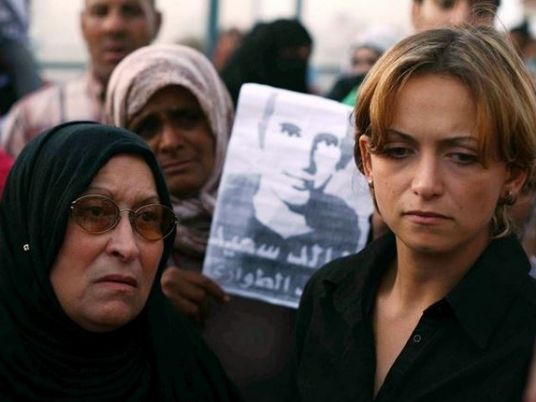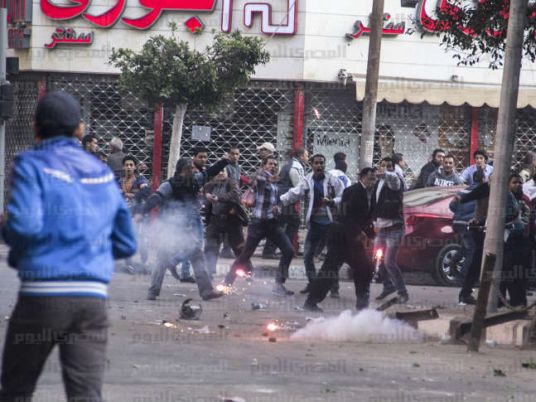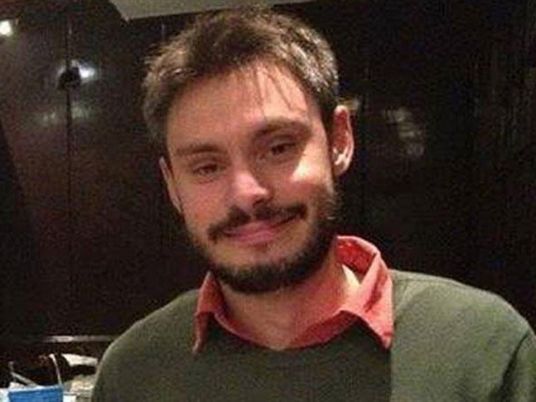Dr. Ayman Fouda has worked in the field of forensic medicine for 40 years and held the position of chief medical examiner for two years from 2005. He shared his thoughts with Al-Masry Al-Youm on the state of forensic medicine in Egypt and the recent controversy surrounding the recent death of Khaled Saeed, who eyewitnesses say was been beaten to death by police officers in Alexandria.
Al-Masry Al-Youm: I’ll start by asking about the alleged killing of Khaled Saeed by the police. Have you been following that?
Dr. Ayman Fouda: Of course. I believe the decision to dissect the body once again was right.
Al-Masry: Why?
Dr. Fouda: A forensic medicine committee must verify that what the medical examiner wrote in the first report was correct and that the medical examiner was not put under pressure to change any information.
Besides, it is quite illogical that anyone would put an entire roll of marijuana into his throat. Therefore we have to find out if it was Saeed who actually swallowed the roll, or if it was inserted into his throat after his death. Also, the injuries in his body need to be linked to the testimonies of witnesses who said they saw the young man being beaten.
Samples should have been sent for laboratory analysis to determine whether Saeed was on drugs, especially since nothing logical could possibly drive him to swallow a roll of marijuana.
Al-Masry: But the second report has not added any new information…
Dr. Fouda: I think the new report is incomplete and should be reconsidered.
Al-Masry: Why?
Dr. Fouda: Because the mechanics of the injuries were not examined or linked to how Saeed died. Saeed’s brain should have been examined under a microscope to determine whether he had a concussion or not. The committee should have also weighed his brain, because an increase in its weight would have indicated that his brain was swollen and hence that he suffered a concussion.
The Forensic Medicine Authority states that the technical office of the chief medical examiner did not participate in putting together the report.
Al-Masry: What are the capacities of the chief medical examiner?
Dr. Fouda: The chief medical examiner’s powers are in fact limited.
Al-Masry: In what sense?
Dr. Fouda: When Mohamed Ali established the Forensic Medicine Authority he wanted it to be independent and to be headed by medical examiners.
There is a supreme consultative council, led by the Justice Minister, the head of the Cairo Court of Appeal, the Attorney General, the chief medical examiner, and the head of the forensic medicine department at Cairo University. However, the council is frozen and it is the assistant Justice Minister for Forensic Medicine Affairs who actually runs the council. The chief medical examiner cannot take any decision without first going back to that assistant.
Al-Masry: What kind of decision are you talking about here?
Dr. Fouda: Any. The chief medical examiner is limited in his capacities and any decision he makes to promote someone, for instance, has to be approved by the Justice Minister. So how can this authority be described as independent?
Al-Masry: Does that mean the results of some of the reports are manipulated?
Dr. Fouda: No, because the medical examiners are scrupulous.
Al-Masry: How accurate are the reports produced by the Forensic Medicine Authority?
Dr. Fouda: The shortage in some areas of specialization, the limited number of medical examiners, coupled with a lack of interest in exchanging experience with more advanced countries mean these reports are only 90 percent accurate.
Al-Masry: So are the medical examiners sometimes pressured to produce certain results?
Dr. Fouda: It’s a matter of conscience. Besides, a medical examiner uses whatever scientific information is available, and so the more the information he has, the more accurate are the results.
Al-Masry: Since medical examiners are essentially technical judges, do they enjoy any immunity?
Dr. Fouda: They have partial immunity. They cannot be questioned except upon a decision by the Attorney General himself or disciplinary bodies concerned with the work of medical examiners.
Al-Masry: Would they be affected if this immunity were removed?
Dr. Fouda: It concerns some medical examiners, but does not necessarily prompt them to falsify their reports. It makes them intimidated at least. That’s why they must be completely independent; they are technical judges.
Al-Masry: What is the solution in your opinion?
Dr. Fouda: The authority should enjoy independence just like other judicial bodies. The Grand Sheikh of Al-Azhar, for example, does not have to refer to the cabinet minister before issuing a fatwa (religious decree), and the same should apply to the chief forensic doctor. Law 96/1952, which regulates our practice, was issued during the days of monarchy and does not therefore fit a republic. This law should be amended in a way that grants the forensic authority its independence and a separate budget, with the responsibility of its management in the hands of the country’s chief forensic doctor and his consultative council.
Al-Masry: What are the difficulties the agency is facing?
Dr. Fouda: A shortage in specialized labor.
Al-Masry: Meaning?
Dr. Fouda: Meaning that current agents only possess general knowledge. We do not have for example dental specialists, and physicians don’t study dentistry, which as a result makes them unable to give their opinion on relevant issues. This branch of medicine, however, is very important as it helps identify a person and his age. We are consequently obliged to seek dentists who are not employed at the authority. There is also a need for radiologists and psychiatrists of high efficiency and experience. The last, extremely important specialization we lack is mechanical physics. A forensic medicine does not have a background on weapons or a bullet’s speed, but at the same time is asked to check these weapons.
Al-Masry: Do you then seek the assistance of experts and engineers to check weapons?
Dr. Fouda: No, we just rely on experience.
Al-Masry: What do you mean by experience?
Dr. Fouda: I mean that our doctors rely on the experience they get from other people. They tackled these branches partially in their college studies, but did not go deeper. So, we have to fulfil our need for these specializations.
Al-Masry: Why doesn’t the authority work to bridge this gap?
Dr. Fouda: We already demanded the Ministry of Justice do that, but they failed to meet the demand due to the cost (LE30 million). But I believe this is not a lot of money for the people to enjoy justice.
Al-Masry: How many forensic examiners do we have?
Dr. Fouda: The number was 32 in 1980, then reached 76, and kept fluctuating due to poor payment. The current number is 71 nationwide. While the original manpower of the authority is supposed to be 96 medicines, we never reach this number, because as soon as the doctors have graduated they move to other Arab states where they receive a monthly payment of LE25,000-40.000. For example, all forensic examiners in Saudi Arabia are Egyptians, and there are 22 in Kuwait, six in Bahrain, 18 in Libya, three in Yemen, and nine in Oman. The reason for this is the low salaries doctors in Egypt receive, comparing to the salaries available in these countries, where working on just one case per month is considered a big task.
Al-Masry: How many cases do the doctors run up annually?
Dr. Fouda: It ranges between 30,000 and 32,000 yearly.
Al-Masry: Doesn’t this big number form a heavy burden, given the limited number of examiners?
Dr. Fouda: Sure, it is a huge number, one doctor becomes responsible for an average of 65 cases per month. I believe the whole authority needs a drastic overhaul since it continues to adopt the same system that was in place at a time when there were only four medical examiners and nearly 9 million as a total population. It is enough for me to tell you that this grandiose building contains one floor only for forensic medicine, while the right thing to do would be to devote a separate building for forensics labs. There are about 74 laboratory doctors crammed into 500 meters.
Al-Masry: But you were the chief medical examiner–why did not you push for changing the conditions?
Dr. Fouda: I submitted several memos demanding change. I requested establishing forensic medicine facilities within hospitals or devoting separate buildings for this practice. The reality is that all the forensic labs and facilities in the provinces are housed in small apartments that are rented for LE8 per month, but this is not the case in Cairo and Alexandria.
Al-Masry: Does that mean that these (provincial) offices are not provided with the necessary equipment?
Dr. Fouda: Of course they are not. Yet, this is where people are examined, and in case lab analyses are needed, they have to come to Cairo to make them, and no doubt samples get damaged on the way. It is vital that each province gets their own forensic labs. I already demanded the establishment of eight forensic areas, with the head of each acting as assistant to the chief examiner. A decree by the Minister of Justice in 2006 approved the proposal, but has not yet been put into force.
Al-Masry: What about the examining tools?
Dr. Fouda: They are 80 percent sound, but still need annual improvement. We lack the examination tools for sexual abuse and homosexual cases, plus brain scanning sets. We are obliged to refer these cases to hospitals.
Translated from the Arabic Edition.




